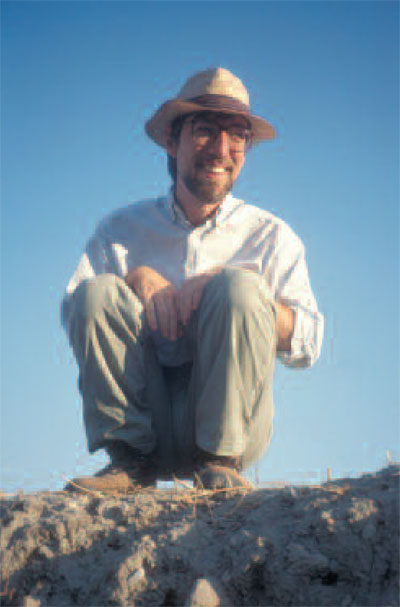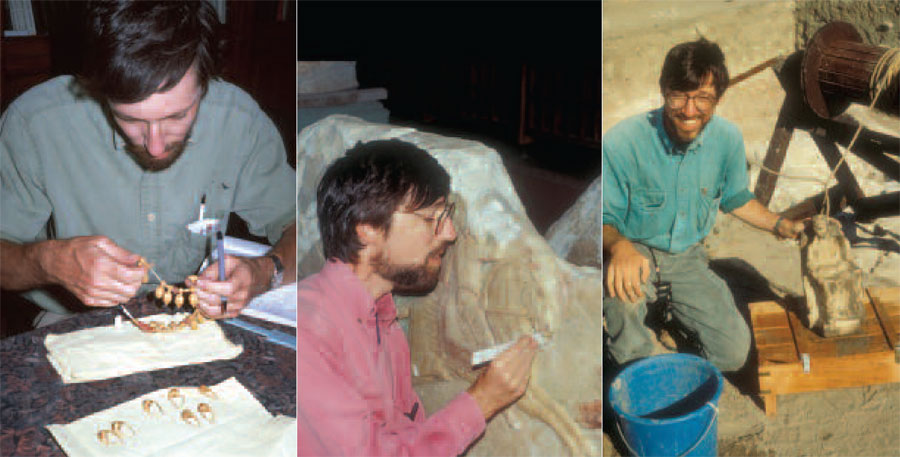 The spark that led to a career in the archaeology of the Mediterranean world for C. Brian Rose, Curator-in-Charge of the Museum’s Mediterranean Section, was his participation on excavations in Italy in 1973 as a high school exchange student in the American Field Service program. The following year he became an undergraduate at Haverford College, where he majored in Classical and Near Eastern Archaeology by cross-registering at Bryn Mawr College. His experience in Italy made the study of the Roman period particularly appealing.
The spark that led to a career in the archaeology of the Mediterranean world for C. Brian Rose, Curator-in-Charge of the Museum’s Mediterranean Section, was his participation on excavations in Italy in 1973 as a high school exchange student in the American Field Service program. The following year he became an undergraduate at Haverford College, where he majored in Classical and Near Eastern Archaeology by cross-registering at Bryn Mawr College. His experience in Italy made the study of the Roman period particularly appealing.
After graduating from Haverford in 1978, Rose pursued his Ph.D. in Classical Archaeology at Columbia University. Concentrating on the Roman Imperial period, his interests expanded to include the eastern Mediterranean, where he took part in New York University’s excavation at Aphrodisias, Turkey, and the uncovering there of a large and extremely well-preserved early 1st century AD sanctuary dedicated to the Imperial Cult (the cult of the emperors). His thesis, completed in 1987 and published in 1997 by Cambridge University Press, examined the sculpture, coins, and inscriptions associated with the Imperial Cult throughout the Mediterranean world during the period demarked by the life of Julius Caesar (100–44 BC) through to the suicide of Nero in AD 68. Focusing on regional variation in dynastic commemoration, Rose assessed how the multiplicity of divorces, adoptions, and assassinations in Imperial Rome’s first dynasty affected the design of monuments and coinage, especially in the Roman provinces.
In 1987 Rose accepted a position as Assistant Professor in the Department of Classics at the University of Cincinnati, where he became Associate Professor in 1993 and Professor in 2000. While at Cincinnati, Rose collaborated with the late Manfred Korfmann (University of Tübingen) on a new campaign of excavations at Troy in northwestern Turkey. The resulting 15-year project examined the Bronze Age deposits (ca. 3000–1000 BC)—the period during which the Trojan War described by Homer occurred—and more importantly, the Greek, Roman, and Byzantine deposits (ca. 1000 BC–AD 1300) which earlier excavations had largely ignored. Rose’s focus at Troy was on these later periods, and his research has substantially revised interpretations of habitation and trade in this region of Turkey during the post-Bronze Age periods. To facilitate the dissemination of their research, Rose and Korfmann established Studia Troica, a peer-reviewed journal that publishes each season’s excavation results within a year’s time, as well as articles from other excavations in the Troad— the region around Troy.
In 2005 Rose came to the University of Pennsylvania as the James B. Pritchard Professor in Classical Studies and Curator of the Museum’s Mediterranean Section. He now conducts field research on two projects. The Granicus River Valley Archaeological Survey Project in northwestern Turkey (which he began in 2004 while at Cincinnati) locates, maps, and conserves tombs dating to the 1st millennium BC and assesses the region’s settlement patterns during the period of Greek and Persian control. His second project is the Museum’s long-standing commitment to fieldwork at Gordion. Working in collaboration with Kenneth Sams (University of North Carolina-Chapel Hill) and Mary Voigt (The College of William and Mary), Rose is particularly interested in Gordion’s lower city and outer settlements, where he will be using remote sensing techniques, such as ground-penetrating radar and magnetometry, to locate structures and other sub-surface features.

(middle) Rose measures the height of relief on a painted marble sarcophagus discovered near the city of Çan in north- western Turkey (ca. 400 BC).
(right) Rose poses with a statue of Cybele, the Anatolian/Roman goddess of fertility, soon after its extraction from a well at Troy.
Brian Rose is currently the President of the Archaeological Institute of America, a member of the Board of Directors of the American Research Institute in Turkey, and a Trustee of the American Academy in Rome. He is committed to the preservation of cultural heritage, using several public outreach programs to highlight the issues of looting, the black-market trade in art and antiquities, and damage to archaeological sites. He has given numerous national and international pub- lic lectures about archaeology and has organized major conferences and symposia that brought together government officials and archaeologists from Afghanistan and Iraq. Working with the U.S. Central Command, Rose also established a cultural heritage lecture program at Fort Bliss, Texas, and Camp LeJeune, North Carolina, for soldiers scheduled to serve in Afghanistan and Iraq. These lectures discuss historic preservation, conservation, and the importance of objects in context, as well as the similarities between these regions in antiquity and our own culture today.
